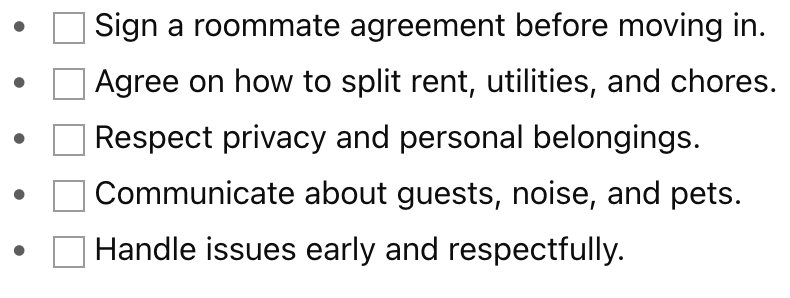Living with roommates can save money and make renting more affordable; but it also comes with challenges.
A clear agreement and good habits can prevent small problems from turning into major conflicts.
📄 Roommate Agreements: Why They Matter
A written roommate agreement helps set expectations and avoids confusion. It’s not the same as your lease with the landlord — it’s an agreement between roommates.
What to Include:
- Rent & Utilities: Who pays what, and when.
- Shared Expenses: Groceries, cleaning supplies, internet.
- Cleaning Duties: Weekly chores, rotating schedules.
- Guests & Overnight Stays: How often, and what’s acceptable.
- Noise & Quiet Hours: Respect for work, study, and sleep.
- Pets: Rules for care, mess, and allergies.
- Move-Out Process: Notice required and responsibilities when leaving.
👉 Pro tip: Write it down, have everyone sign, and keep a copy.
🤝 Roommate Etiquette: Living Respectfully
- Pay bills on time: Don’t make others cover your share.
- Clean up after yourself: Especially in shared spaces like the kitchen and bathroom.
- Respect personal space: Knock before entering rooms.
- Communicate openly: Bring up small issues early before they grow.
- Share fairly: Don’t hog common areas or utilities.
- Be considerate: Keep noise down late at night, and don’t monopolize the shower.
🗣️ Conflict Resolution Tips
- Stay calm: Avoid yelling or blaming.
- Use “I” statements: “I feel frustrated when dishes pile up” instead of “You’re a slob.”
- Offer solutions: Suggest fair compromises.
- Mediation: If conflicts get serious, ask a neutral friend or landlord to step in.
✅ Quick Checklist

🔑 Key Takeaway
Good roommates make life easier, bad ones make life miserable.
Set clear rules, respect each other’s space, and keep communication open — it’s the recipe for a peaceful shared home.

